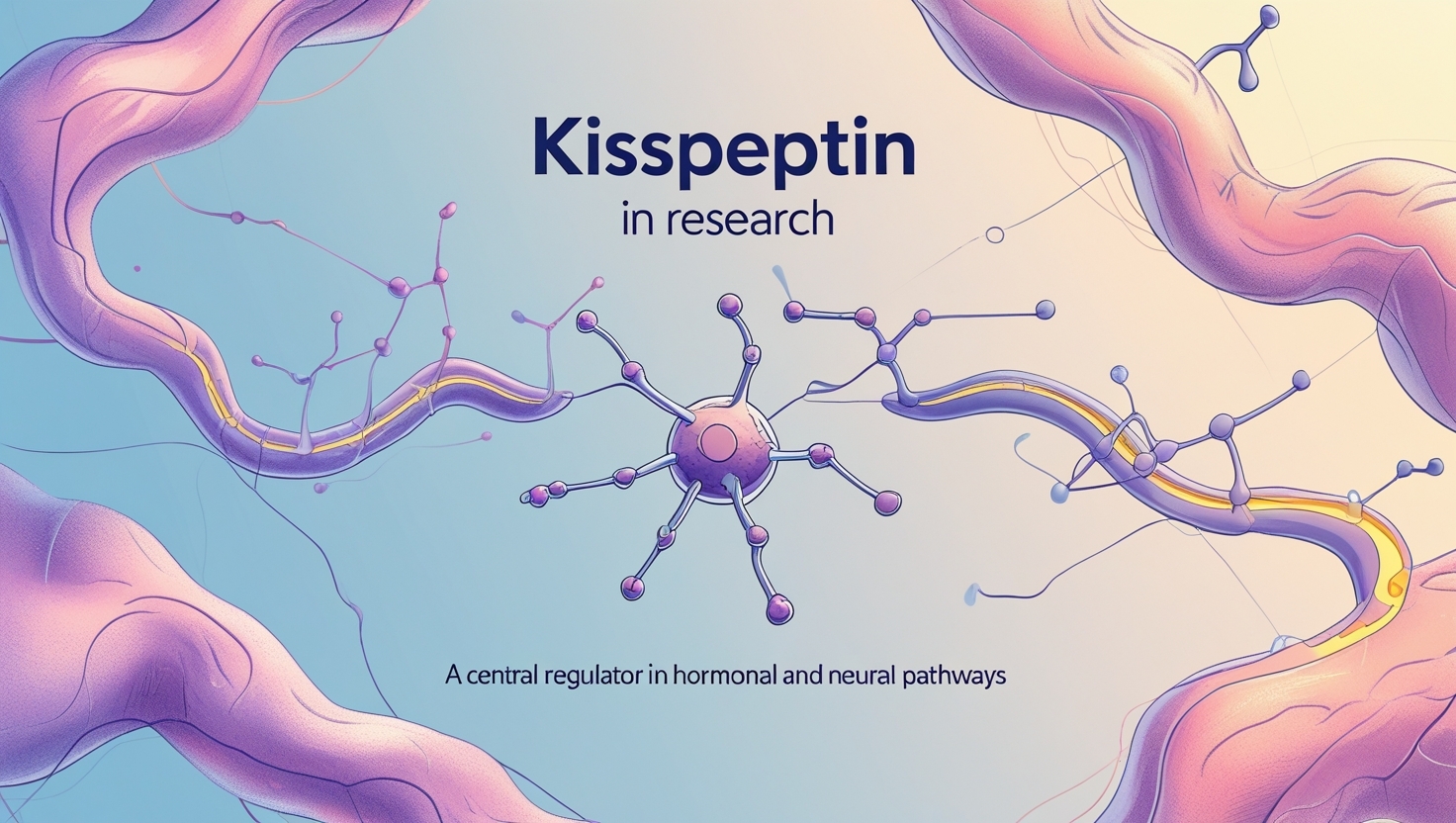Kisspeptin in Research: A Central Regulator in Hormonal and Neural Pathways

Kisspeptin has emerged as a pivotal molecule in endocrine and neurological research, playing a foundational role in the regulation of reproductive hormones and neuronal signaling. Initially discovered for its tumor-suppressing functions, Kisspeptin is now recognized for its influence over the hypothalamic-pituitary-gonadal (HPG) axis, making it an indispensable agent in studies on puberty, fertility, mood regulation, and neuroendocrine function. Researchers aiming to buy peptides online often prioritize Kisspeptin for its robust impact on GnRH secretion and its direct implications for human hormone research.
Hormonal Modulation: Kisspeptin’s Role in GnRH and LH Pulsatility
Kisspeptin's most well-documented function is its stimulation of gonadotropin-releasing hormone (GnRH) neurons in the hypothalamus. Once bound to the GPR54 receptor, Kisspeptin triggers GnRH release, which subsequently initiates the secretion of luteinizing hormone (LH) and follicle-stimulating hormone (FSH) from the pituitary. These hormones drive the reproductive cascade—controlling ovulation in females and spermatogenesis in males.
What sets Kisspeptin apart in endocrine studies is its precise control over hormone pulsatility. In research models, kisspeptin administration has induced immediate and dose-dependent surges in LH and FSH, illustrating its central regulatory power. The potential for timed delivery through exogenous peptide protocols offers researchers control over hormonal timing, particularly in studies exploring assisted reproductive technology (ART), delayed puberty, or hypogonadotropic conditions.
With the growing interest in manipulating neuroendocrine timing in lab-controlled scenarios, institutions often buy kisspeptin in research-grade form to probe these mechanisms at both molecular and systemic levels.
Neural Implications: Kisspeptin and Brain Function Beyond Reproduction
Beyond its impact on the HPG axis, Kisspeptin also influences neural networks related to behavior, emotion, and cognitive regulation. Expression of the Kiss1 gene and its receptors has been observed in areas of the brain associated with limbic function, including the amygdala and hippocampus. This distribution has led researchers to explore Kisspeptin's potential as a neuromodulator, particularly in relation to mood, sexual behavior, and anxiety responses.
Experimental data reveal that Kisspeptin may enhance activity in emotional processing centers, correlating with improved mood and reduced anxiety-like behavior in animal models. These effects are believed to result from Kisspeptin’s interaction with dopamine and serotonin systems, making it a promising candidate for neurobehavioral research. Its ability to modulate both reproductive drive and emotional reactivity provides a rare dual role for a single peptide.
When evaluating its interaction with other hormonal agents in recovery-based trials, Kisspeptin has also shown promise in complementing post-cycle research protocols. This positions it as a potential adjunct to agents explored when determining the best PCT for SARMs, particularly in models recovering from HPG axis suppression.
Applications in Fertility and Developmental Biology
Kisspeptin’s regulatory influence on puberty and fertility continues to fuel its integration into developmental biology studies. In both male and female research models, exogenous Kisspeptin administration has successfully induced the onset of puberty or restored fertility-related hormonal patterns. This has immense implications for identifying and treating idiopathic hypogonadism, amenorrhea, or delayed gonadal development.
In primate and rodent models, long-term Kisspeptin exposure has demonstrated the ability to stimulate testicular and ovarian growth, increase gamete production, and support overall reproductive viability. These findings highlight its role as both a diagnostic biomarker and a therapeutic candidate in translational medicine.
Moreover, its precise receptor targeting and low toxicity profile make it an ideal molecule for longitudinal hormone studies, where consistency and minimal systemic interference are essential.
Research Methodology: Delivery Routes and Dosing Strategies
Administration of Kisspeptin in experimental settings can be tailored to achieve specific outcomes. Intravenous, subcutaneous, and intranasal routes have all been studied, each offering distinct absorption profiles. The peptide’s half-life and bioavailability vary slightly depending on the form and route, but engineered analogs have been developed to enhance duration and receptor binding.
In protocols focused on acute hormonal response, bolus injections of Kisspeptin can produce immediate LH surges, ideal for mapping pituitary responsiveness. For chronic models exploring reproductive cycles or pubertal progression, sustained delivery through micro-pumps or extended-release formulations has been used to maintain stable physiological stimulation.
Researchers designing such protocols often select high-purity peptides and incorporate real-time hormonal assays to correlate behavioral and endocrine changes, further validating Kisspeptin's functional reliability in neural and hormonal regulation.
Conclusion: Kisspeptin’s Expanding Role in Endocrine and Neural Science
Kisspeptin stands at the intersection of reproductive endocrinology and neurobiology, offering researchers a unique tool to explore the synchronization of hormonal and behavioral systems. From regulating puberty onset to modulating emotional response, its influence spans vital physiological domains with high translational value.
The peptide’s clean safety profile, receptor specificity, and multi-systemic engagement position it as a cornerstone in modern peptide-based research. As clinical interest grows and delivery methods continue to evolve, Kisspeptin remains a benchmark compound for studying the interplay between the endocrine system and neural pathways.
- Art
- Causes
- Crafts
- Dance
- Drinks
- Film
- Fitness
- Food
- Giochi
- Gardening
- Health
- Home
- Literature
- Music
- Networking
- Altre informazioni
- Party
- Religion
- Shopping
- Sports
- Theater
- Wellness


